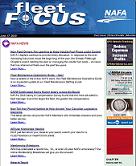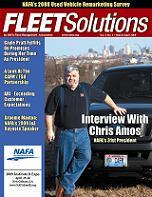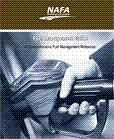NAFA Connection
NAFA Fleet Management Association
by Matthew Betz
Vice President, National Account Sales
AmeriFleet Transportation
At the conclusion of the NAFA I&E in New Orleans, NAFA started a new year, with new officers, new challenges, and an exciting new direction. I am proud to have been elected NAFA Affiliate Trustee and am anxious to contribute to the organization's success.
The Affiliates Committee is the recognized representation of all Affiliates to the NAFA organization. The Committee's purpose is to present the interests and concerns of Affiliates to NAFA and to support the mission and goals of the association. It will be my honor to work with the Affiliates Committee and do whatever I can to help it fulfill that purpose.
In challenging times, the best plan is often a simple plan. Re-evaluating the allocation of resources and the return on investment an organization gains is essential to success and continued growth. NAFA and the Affiliates Committee are no exception. Therefore, my approach over the next year will be focused on ensuring that the time, money, and other resources that are invested by Affiliates return the most valuable results for both NAFA and the Affiliates who support the organization.
As we reviewed the involvement and contribution of Affiliates over the years, a few key ideas began to form. While we won't limit ourselves to these four approaches, they will be my focus over the next year:
- Look for ways to gain optimum value for Affiliates and NAFA from affiliate monetary sponsorships
- Promote Affiliates as valuable contributors to NAFA's education efforts
- Help Affiliates recognize the value in networking, selling to, and gaining the trust of the evolving mix of members in our organization.
- Gain recognition for Affiliates as a premier source of industry knowledge for members as they face the daily challenges of their job.
We look forward to working with you to ensure the success of our organization.
After 22 years with Pfizer and legacy companies 40-plus years in the fleet industry, Stephen Levine, Director U.S. Fleet, is retiring.
Levine joined NAFA in 1980 and served on several committees. He served as Michigan Chapter Vice Chair (1991-1993 and again from 1997-1999), Chair of the Michigan Chapter (1993-1995), Co-Chair of the National Membership Committee (1994), Chair of the Chapter Maintenance Committee (1996-1997), and Vice Chair of the National Audit Committee (2007-2008). He also served as a member on the National Safety Committee, a member of the National Legislative Group, and most recently, as a member on the National Audit Committee.
Levine started his career in the rent-a-car business, moved to a leasing company, then managed the national WarnerAmex Cable TV truck fleet before joining Pfizer/Upjohn. At Upjohn, he was also the Small Business Liaison Officer for minority and small business procurement, helped oversee the American Express Purchasing Card program, and trained to be a Covey Instructor for The Seven Habits of Highly Effective People. Levine and his team lead a fleet of more than 13,000 vehicles at one time successfully through the integration of two mergers.
Some of his accomplishments include transitioning Pfizer to a common vendor and single data base; automating Driver Tax Compliance to minimize driver and central administration; automating the vehicle ordering process to include award vehicles; doubling minority procurement at The Upjohn Company; representing the fleet industry and testifying before a Congressional Committee regarding clean air; and helping implement a driver safety program at Upjohn and Pfizer. Finally, Levine was awarded the Professional Fleet Manager of the Year in 1999.
Charlie Schott, Asia/LA Regional Fleet Director, will transition to Americas Fleet Director role starting immediately. Joan Last, Senior Fleet Administrator, will report to Schott. Are you new to fleet? Have less than five years experience? Well then you need to sign up for the Fleet Management Seminar offered Oct. 14-16 at the Marriot Detroit at the Renaissance Center in Detroit, Mich.
- Network with fleet colleagues on an international level
- Ask questions to help you address your specific projects
- Share in this interactive and intense classroom environment
Expand your fleet knowledge and gain a deeper level of instruction and scholarship. At NAFA's Advanced Fleet Management Seminar, you will solve problems and discuss new ideas with NAFA's most experienced and knowledgeable expert instructors. The Advanced Seminar is offered Oct. 16-18 at the Marriott Detroit at the Renaissance Center in Detroit, Mich.
- An intense, upper-level course
- Eight interactive sessions covering disciplines in-depth
- A great study tool for the CAFM or CAFS exam
- Learn from the experts themselves!
Reserve your seat by Sept. 23 and SAVE with our early bird pricing. Register online at www.nafa.org/fms.
|
Become An Expert With Our Package Deal! Enroll in both the FMS and the AFMS by the early bird deadline of Sept. 23 and SAVE more than $250! Refresh your skills and knowledge at the Fleet Management Seminar and then receive a deeper level of instruction and scholarship at the Advanced Seminar. This is a perfect opportunity for those studying for the CAFM or CAFS exam. Register for the combo deal at www.nafa.org/afms! |
To receive a group rate of $159 per night (plus applicable taxes), call the Detroit Marriott directly at (800) 228-9290 or visit www.nafa.org/fms for online reservations. Use the code nfmnfma; the cut-off date for group rate is Sept. 21, 2009.
Did you know NAFA's Affiliates Links features more than 30 fleet specialties and services? These topics of specialty can help you with projects or provide you with information on potential suppliers, and help you when you're seeking a list of vendors to receive RFPs.
Whether you're looking for alternative fuels, fleet management solutions, leasing, or maintenance – the Affiliates Database has it for you! This database is becoming so popular that NAFA has eight experts under the After-Market Suppliers title and eight for Internet-based Vehicle Location Management and GPS Tracking. Just click here to access NAFA's Affiliates Links.
Early Bird Deadline Ends August 28.
NAFA Institute & Expo Priority Period in Full Swing
Show Dates: April 25–26, 2010
COBO Center
Wayne & Oakland Exhibit Hall
Detroit, Mich.
Two Top Reasons to Reserve Your Booth Today:
- Meet Fleet Decision-Makers
NAFA Members are composed of both commercial (60 percent) and government (40 percent) fleet managers and are responsible for more than 3.5 million vehicles. - Green Zone is Hot
With alternative fuels being in the headlines, the NAFA I&E Green Zone will draw buyers to the floor.
Why Participate and Get Your Colleagues to Join?
- Build your network, which may help in your next project.
- Get a chance to win a free trip to I&E, including hotel and travel expenses (the Membership Drive Grand Prize Pack, including I&E conference registration, hotel, and airfare)
- Get a chance to win a free I&E registration.
- Receive a $10 coupon good toward any NAFA product for each new NAFA Member you get to join.
- Strengthen your association, which provides fleet solutions for all fleet professionals.
- Build your opportunity to become more involved in your association – and truly make it your association.
For complete details and contest rules, visit www.nafa.org/2009drive.
- Get Started Today With Your Recruiting Toolbox!
Download our special Member application, and don't forget to put your name on the "SPONSOR" line before distributing.
US and Canadian Member Application
International Member Application - Good Web pages to refer to:
Top Reasons To Join
Testimonials
Membership Benefits
www.nafa.org/join - Spread the word. Here's some ideas how:
- Invite a colleague to a local meeting.
- E-mail fellow professionals (see above links).
- Contact your local chapter chair for a list of prospective Members.
- Research similar companies in your area and find out who runs their fleets.
- E-mail NAFA's Membership Department directly for a prospect Member to contact.
 FleetFOCUS is the Association's official e-mailed newsletter that provides the latest up-to-date industry news, NAFA news and events, information on environmental enhancements in the industry, NAFA store sales, information on membership benefits and programs, and valuable career postings and network opportunities.
FleetFOCUS is the Association's official e-mailed newsletter that provides the latest up-to-date industry news, NAFA news and events, information on environmental enhancements in the industry, NAFA store sales, information on membership benefits and programs, and valuable career postings and network opportunities.- FleetFOCUS saves you valuable time and effort with its comprehensive scope, relaying headline news, legislative updates, career network opportunities, and the latest association happenings at the local and national levels.
- Twice each month, your issue of FleetFOCUS is e-mailed to your attention, putting critical information about the fleet management and automotive industry directly in your inbox!
- Each issue groups articles into eight major sections, making accessing information easy to locate.
- NAFA News
- Headline News
- What's Green in the Industry
- Chapter Highlights
- Membership Benefits You
- Legislative News
- Online NAFA Store
- Career Corner
- Review and applaud key Membership Milestones of your friends and NAFA colleagues.
- Plan to attend your next NAFA Chapter meeting with FleetFOCUS' quick list of the latest month's local happenings at all NAFA Chapters.
FLEETSolutions Helps You Excel!

- NAFA Members and Affiliates share their experiences, giving you interdisciplinary knowledge cutting across all industries. Comprehensive educational content keeps you informed about:
- Asset Management
- Business Management
- Financial Management
- Fleet Information Management
- Maintenance Management
- Risk Management
- Vehicle Fuel Management
- Professional Development
- Color-coded tabs help you locate information on the specific, professional disciplines. Important results of NAFA surveys allow you to compare your practices, policies, and experiences against those of your NAFA colleagues.
- Spotlights on leasing companies, remarketing strategies, industry leaders, and key partners provide the latest perspectives in the profession.
- The publication gives you valuable, well-rounded, comprehensive education of the subject matter, no matter your industry or fleet.
- NAFA's magazine is a great resource for all experience levels.
Among other valuable benefits, your NAFA membership dues and fees pay for an annual subscription to FLEETSolutions. In addition to the print and digital versions of the magazine sent directly to your attention, you'll find each issue of FLEETSolutions archived online. This online archive is available only for NAFA Members and Affiliates, so you'll need to log in with your unique NAFA username and password. Just go to www.nafa.org, find the "Resource Center" tab, and click on Publications and References. This link will provide you with a list of NAFA publications. Click on FleetFOCUS, and all issues will be listed according to date. Remember, with FleetFOCUS being an exclusive benefit of NAFA membership, you'll need your unique NAFA username and password. Or click on FLEETSolutions and all issues will be listed according to date. Take part in NAFA's new Certified Automotive Fleet Supervisor (CAFS) certification program or Certified Automotive Fleet Manager (CAFM) program. Both certificates will give you a leg up on your peers.
If you're interested in a career as a technician or assistant, or in other positions in the fleet-related field, the Certified Automotive Fleet Supervisor certification program is for you. The CAFS program is open to any individual with at least one year of experience as a fleet manager, assistant manager, fleet supervisor, or other fleet-related position, and it is open to those enrolled in a college or university program in a fleet-related discipline.
This CAFS certificate is awarded to those who show a proven proficiency in four specific aspects of fleet management and who may ultimately continue their educational path towards the completion of a CAFM designation – the highest and most comprehensive certification in the fleet industry.
"The CAFM program is the only certification program that proves an individual's expertise in fleet. Other certification programs may attest that a person has minimum basic knowledge of fleet, but the CAFM program proves the person is an expert," stated Phillip Russo, CAE, NAFA Executive Director.
|
CAFM Certification Earns Higher Salary Across the Board NAFA Members were polled on their salaries and compensation relative to the specifics of their fleet back in the fall of 2008. The response? The more educated a fleet manager is and the larger the fleet, the greater the compensation. Of all the certifications included in the survey, those with a CAFM made the most, compared to those who earned a CPFP (Certified Public Fleet Professional), who made an average of $59,000, and those with a CEM (Certified Equipment Manager) who made an average of $55,000. The average salary of corporate fleet managers who earned a CAFM (Certified Automotive Fleet Manager certificate) was $77,000, compared to those without a certification, who made an average of $71,000. |
To earn the CAFM designation, an applicant must pass a series of comprehensive examinations to demonstrate expertise in the eight disciplines of automotive fleet management: Fleet Information Management, Maintenance Management, Professional Development, Vehicle Fuel Management, Asset Management, Business Management, Financial Management, and Risk Management. Designed to identify and recognize exceptional fleet management professionals, many employers now require fleet managers to obtain the CAFM designation prior to, or shortly after, employment.
"After 13 years and a variety of positions in the fleet industry, I felt it was time to challenge myself. After looking at the opportunities available, it was evident that the NAFA CAFM program was the most respected program available in the fleet industry. My employer stood behind me throughout the CAFM experience and understood that attaining this certification adds value to my position," said Donald M. Lubinsky, CAFM, Director Automotive for AMTRAK.
A CAFM certification clearly makes a fleet professional stand apart from the competition. Currently, fewer than 400 fleet managers have joined the exclusive ranks of CAFM certification holders. For more information about the CAFM or CAFS program, click here. As a fleet professional, you have valuable knowledge and numerous experiences with a wide variety of fleet concerns that fleet managers would benefit from learning about. NAFA needs this information and perspective, as NAFA Affiliates are an important part of the NAFA family!
NAFA wants your input for educational articles in NAFA publications! What are you doing to save money? How do you see the economy affecting and impacting fleet management? These are just a handful of topics.
Share your ideas today. Don't just talk about your ideas to your peers; submit your idea for a FLEETSolutions or FleetFOCUS article. Contact Gary Wien, Communications Manager, at gwien@nafa.org, or Tina Perrotta, Communications Assistant, at tperrotta@nafa.org, with your suggestions.
 Fuel Management Guide
Fuel Management Guide
Designed with you in mind, the guide will help you understand fuel supply and demand dynamics to better anticipate price changes; understand key fuel standards; and identify appropriate policies, activities, and technologies to improve fuel efficiency. A valuable appendix, comprised of additional references, makes this an "evergreen" learning tool, as links to current websites provide you direct access to the most current information on fuels and pricing, as well as from government authorities, non-profit and association websites, and manufacturers.
Information is easily accessible, as detailed chapters explore the issues associated with the centralized fuel management of conventional fuels; a variety of tools to fuel decentralized fleets; and alternative fuels and advanced technology vehicles, including forms of hybrid drive trains currently available.
The guide is available in three formats to meet your project and budget needs.
- The e-download gives you instant access and portability – store it virtually anywhere: in your own "NAFA document folder," on your computer, or on your flash drive to take with you.
- The CD version offers the same practical abilities as the e-downloadable format and is a product ready to share with other members of your fleet management team or add to the department's reference shelves.
- The more traditional, spiral-bound, soft-cover book provides for easy use, especially when sharing references with colleagues. Order today!
Just two easy steps can help your colleagues keep in touch. To make changes to your membership record: 1) click on "My Profile" on the NAFA homepage and submit changes, or 2) e-mail info@nafa.org.
 The National Highway Traffic Safety Administration issued stringent new braking standards that will save lives, by improving large truck stopping distance by 30 percent.
The National Highway Traffic Safety Administration issued stringent new braking standards that will save lives, by improving large truck stopping distance by 30 percent.NHTSA estimates that the new braking requirement will save 227 lives annually and will also prevent 300 serious injuries. It is estimated to reduce property damage costs by more than $169 million annually.
The new standard requires that a tractor-trailer traveling at 60 miles per hour come to a complete stop in 250 feet. The old standard required a complete stop within 355 feet. The new regulation will be phased in over four years beginning with 2012 models.
The new rule should speed up the introduction of the latest brake technology into America's freight hauling fleets and will help truck drivers avoid collisions with other vehicles. The new rule applies only to truck tractors and does not include single-unit trucks, trailers, and buses.
The latest statistics from NHTSA show that large commercial vehicles continue to show a decrease in their involvement in fatal crashes. In 2008, 4,229 people were killed in crashes involving large trucks, down 12 percent from the 4,822 deaths recorded in 2007.
To read the final rule, click here. Several large-scale, naturalistic driving studies conducted by the Virginia Tech Transportation Institute (VTTI), provide a clear picture of driver distraction and cell phone use under real-world driving conditions. Combined, these studies continuously observed drivers for more than 6 million miles of driving. A snapshot of risk estimates from these studies is shown in the table below.
"Given recent catastrophic crash events and disturbing trends, there is an alarming amount of misinformation and confusion regarding cell phone and texting use while behind the wheel of a vehicle. The findings from our research at VTTI can help begin to clear up these misconceptions as it is based on real‐world driving data. We conduct transportation safety research in an effort to equip the public with information that can save lives," says Dr. Tom Dingus, Director of the Virginia Tech Transportation Institute.
In VTTI's studies, which included light vehicle drivers and truck drivers, manual manipulation of phones, such as dialing and texting, led to a substantial increase in the risk of being involved in a safety‐critical event (e.g., crash or near crash). However, talking or listening increased risk much less for light vehicles and not at all for trucks. Text messaging on a cell phone was associated with the highest risk of all cell-phone-related tasks.
Several recent high-visibility trucking and transit crashes have been directly linked to texting from a cell phone. VTTI's research showed that driving while text messaging, which had the highest risk of more than 20 times worse than driving while not using a phone, also had the longest duration of eyes off road time (4.6 s over a 6‐s interval). This equates to a driver traveling the length of a football field at 55 mph without looking at the roadway. Talking/listening to a cell phone allowed drivers to maintain eyes on the road and were not associated with an increased safety risk to nearly the same degree.
| CELL PHONE TASK | Risk of Crash or Near Crash Event |
| Light Vehicle/Cars | |
| Dialing Cell Phone | 2.8 times as high as non-distracted driving |
| Talking/Listening to Cell Phone |
1.3 times as high as non-distracted driving |
| Reaching for object (e.g., electronic device and other) |
1.4 times as high as non-distracted driving |
| Heavy Vehicles/Trucks |
|
| Dialing Cell Phone |
5.9 times as high as non-distracted driving |
| Talking/Listening to Cell Phone |
1.0 times as high as non-distracted driving |
| Use/Reach for Electronic Device |
6.7 times as high as non-distracted driving |
| Text Messaging |
23.2 times as high as non-distracted driving |
New Jersey Governor John Corzine announced that with the completion of his second formal initiative in the last three years to reduce the number and usage of state cars, New Jersey's fleet of passenger vehicles has fallen to less than 9,700 -- the lowest point since 2004.
"We have a fundamental and ongoing obligation to run government efficiently and economically. So whether we're cutting gas credit cards or reducing the size of the vehicle fleet, every effort to cut costs helps to reduce the burden on taxpayers to fund the operations of our government," Corzine said.
Through a vehicle "recall" ordered by Corzine this year, state agencies took 445 vehicles out of service. The recall focused on removing high-mileage, less-efficient, and underutilized vehicles that were identified through a comprehensive, agency-by-agency review by the Department of the Treasury's Motor Pool. The recall will reduce the state's annual maintenance and fuel expenses by an estimated $1.1 million while also reducing the environmental impact from the state fleet. After all vehicles from the 2009 recall are auctioned, the state anticipates an additional $500,000 in revenue.
In 2006, a similar recall resulted in a reduction of 835 vehicles from the fleet, netting the state more than $1 million in auction proceeds.
By removing these vehicles from service, the state's passenger fleet now totals 9,671, which compares to 10,550 when Corzine took office in January 2006 -- an 879-vehicle reduction. It is also the lowest count of passenger vehicles since January of 2004. This reduction also takes into account an increase of 455 vehicles assigned to caseworkers in the Department of Children and Families since 2006. The additional vehicles have been part of a larger reform effort to expand and improve services.
State Treasurer David Rousseau noted that the continuing reduction of the state fleet provides material budget relief, noting that fuel costs range from $30 million to $40 million annually.
Commercial fuel cards were recalled by Corzine beginning earlier this year. At the time, there were 1,031 commercial fuel cards issued through the state motor pool. The total has been reduced by more than 80 percent, netting an annual savings of $237,000. Governor Arnold Schwarzenegger ordered the state's motor vehicle fleet to be reduced by 15 percent, following reports of waste and abuse regarding vehicles permitted to be taken home by state employees.
The abuse was reported to the newly created Waste Watchers Web site. An internal Department of Transportation audit available on the Reporting Transparency Web site confirmed similar findings showing a lack of justification for many home storage vehicle permits. By executive order, the governor also directed each state agency and department to conduct an immediate survey of its fleet and identify surplus vehicles to be sold at the Department of General Services' (DGS) "Garage Sale" in late August.
Schwarzenegger issued Executive Order S-14-09 (EO) to launch a comprehensive state fleet reduction effort with a projected savings in the first year of $24.1 million estimated by DGS. The EO directs all state agencies and departments that own or operate vehicles to submit a vehicle reduction plan with a timeline for implementation to the director of DGS.
State departments and agencies will also prioritize which cars are marked for surplus to ensure the newest, most fuel efficient and greenest cars are maintained as part of the state's vehicle fleet. After conducting a survey of vehicles that can quickly be identified as surplus, the departments and agencies will provide those surplus cars to be sold to the public at the DGS garage sale on Aug. 28 and 29 at 1700 National Drive in Sacramento. The garage sale will include other surplus state property for sale including assorted office equipment. LeasePlan USA announced that David G. Dahm, current chief operating officer (COO), will be taking on the role of chief financial officer (CFO), effective immediately.
The CFO position is one that Dahm held for nine years with LeasePlan USA prior to becoming CEO in 2000. "His experience as a former CFO, our CEO, and COO will provide him with a solid foundation to lead our financial efforts once again," said Mike Pitcher, President and CEO.
The announcement came after Annelies Bouma, current CFO, was promoted to the Financial Director and CFO position for LeasePlan Netherlands. Bouma will begin her new role on Sept. 1. Bouma joined LeasePlan USA in August of 2006, after spending four years at LeasePlan Corporation as Senior Vice President of Control, Reporting and Tax.
"During her time with LeasePlan USA, Annelies brought many best practices from LeasePlan Corporation to our finance department and made significant contributions during her international assignment with us," said Pitcher.
LeasePlan USA, a subsidiary of LeasePlan Corp. N.V., is a global leader in vehicle leasing and fleet management solutions. The company, which manages 1.4 million vehicles worldwide, offers clients customized plans for total fleet cost reduction through its technologically advanced products and dedication to customer service. For the third consecutive year, the Motorist Assurance Program (MAP) is sponsoring Brake Safety Awareness Week. The event is annually held the final full week in August, with this year's dates being August 23-29.
During Brake Safety Awareness Week, more than 8,000 MAP participating shops will offer inspections, educate vehicle owners regarding key undercar systems, provide complimentary automotive troubleshooting materials, and answer consumers' preventative maintenance questions.
Consumers can look for a repair facility prominently displaying its "Motorist Assurance Program" decal near its entrance or customer waiting area, or they can find participating stores in a particular area by visiting the MAP website at www.motorist.org.
Throughout this event, MAP – the consumer outreach effort of the Automotive Maintenance
and Repair Association (AMRA) and the nation's leading consumer auto service non-profit
organization – urges consumers to stop at any MAP participating repair shop for a brake and related undercar inspection. MAP also offers tips for choosing and working with qualified repair providers, a list of participating MAP shops in your area, a repair and replacement recommendations look-up for vehicle components, and more at www.motorist.org.

Nine groups across Canada are being supported by the Government of Canada, in order to help Canadians lower vehicle emissions and encourage drivers to improve fuel efficiency. The total investment will be $970,000 and will aid local campaigns in five provinces.
Minister of Natural Resources Lisa Raitt, highlighted the importance of practicing smart driving techniques to help keep Canada's air clean. This new program will help Canadians reduce emissions by taking on driving habits that will lower fuel consumption.
The contribution agreements have been awarded to projects in British Columbia, Manitoba, Ontario, New Brunswick, and Nova Scotia. Projects include:
| Partner | Project Name | Project Details |
| Green Communities Canada | EcoDriver in the GTA | Deliver EcoDriver through six driving schools |
| Clean Air Sudbury and MIRARCO | Fuel-efficient Driving Pilot | Social marketing campaign |
| Province of Manitoba |
Drive Greener Manitoba | Fuel-efficient driving and proper vehicle maintenance |
| Clean Nova Scotia | DriveWiser | Anti-idling and fuel-efficient driving |
| New Brunswick Lung Association | SIMPLE Driver Stewardship Program | Fuel-efficient driving and proper vehicle maintenance |
| Ecology Action Centre, Nova Scotia | Canadian Idle Less | Anti-idling campaign |
| Township of Langley, B.C. | Anti-idling Campaign | Anti-idling campaign |
| One Change, Ontario | One Change: Fuel/Essence | Fuel-efficient driving and proper vehicle maintenance |
| Prince George Air Improvement Roundtable | Fuel-Efficient Driving and Anti-Idling Campaign | Fuel-efficient driving and anti-idling |
The ecoENERGY for Personal Vehicles Program, through which these new agreements have been awarded, supports the Government of Canada's commitment to reduce Canada's total greenhouse gas emissions by 20 percent by the year 2020.

This week, the U.S. Senate is expected to replenish the Cash for Clunkers program. Senate Democratic leaders are planning to follow the House and give another $2 billion to the depleted Cash for Clunkers program, which unexpectedly ran through its $1 billion in federal funds in less than a week.
Called the Car Allowance Rebate System, or CARS, the program offers owners of old cars and trucks $3,500 or $4,500 toward a new, more fuel-efficient vehicle, in exchange for scrapping their old vehicles. Congress last month approved the plan to boost auto sales and remove some inefficient cars and trucks from the roads. The program was scheduled to last through Nov. 1 or until the money ran out, but few predicted the fund would run out so quickly. The $1 billion in funding would provide up to 250,000 new car sales.
Fleet eligibility for the program appears to be limited to a single vehicle. The new law uses the term "person" to describe those eligible to purchase or lease a new vehicle under the Program. The U.S. Department of Transportation (DOT) relies on the universal definition that appears in federal law (1 U.S.C. 1), which includes corporations, companies, associations, firms, partnerships, societies, and joint stock companies, as well as individuals. U.S. DOT adopts this definition for the term "person" in the regulations for the program. Each "person" is subject to the statutory restriction that precludes participation by any person in this program more than once. NAFA Members should, of course, confirm eligibility with legal counsel. Information on the program is available at http://www.cars.gov
A bill has been introduced in the U.S. Senate that would require states to write laws to prohibit text messaging by drivers or risk losing 25 percent of their annual federal highway money. The proposal, sponsored by a group of Democrats including Sen. Charles E. Schumer (N.Y.), came a day after the Virginia Tech Transportation Institute released a study on commercial truck drivers that found texting drivers to be 23 times more likely to be involved in a crash or a near miss. The legislation would set deadlines for Transportation Department regulators to devise minimum penalties for states to implement. States would have two years to enact their own laws.
 The California Air Resources Board and the San Diego Air Pollution Control Board unveiled one of the first school buses in the country to be retrofitted with a pollution control device using American Recovery and Reinvestment Act (economic stimulus) funding from the U.S. Environmental Protection Agency.
The California Air Resources Board and the San Diego Air Pollution Control Board unveiled one of the first school buses in the country to be retrofitted with a pollution control device using American Recovery and Reinvestment Act (economic stimulus) funding from the U.S. Environmental Protection Agency.This funding will allow the San Diego Unified School District to clean up an additional 10 school buses, leaving only seven of its 519-bus fleet without this advanced diesel particulate filtration.
In addition, the San Diego Air Pollution Control District and SDUSD are using this stimulus funding to create or sustain jobs in the manufacturing sector and, with the school district's Automotive Technology Program, paving the way for a greener workforce for tomorrow.
The announcement marks the launch of a state-wide effort, as part of the Diesel Emission Reduction Act State Clean Diesel Program, being implemented by the ARB and other state partners to retrofit more than 80 school buses throughout California with $1.73 million USEPA American Recovery and Reinvestment Act funding. FedEx Corp. announced the addition of 92 hybrid-electric trucks to its delivery fleet — the first standard FedEx delivery trucks converted to hybrid-electric systems.
The addition of the 92 trucks increases the FedEx fleet of hybrid-electric vehicles by more than 50 percent, from 172 to 264. FedEx extends its leadership position with the largest fleet of hybrid delivery trucks in North America.
The hybrid conversions were produced in Charlotte, N.C., during the past six months and created 50 new, temporary green jobs in the area. The converted hybrids were developed with Freightliner Custom Chassis Corporation (FCCC) and Eaton Corporation, which provided the hybrid-electric systems.
The retrofit hybrid trucks are projected to improve fuel economy by 44 percent, decrease particulate matter by 96 percent and reduce smog-causing (NOx) emissions by 75 percent, compared to the standard FedEx Express delivery truck. The 92 retrofitted hybrid vehicles will be placed into service in California, primarily in the Los Angeles, San Diego, and San Francisco metropolitan areas. Two years after unveiling San Diego's first state-of the art plug-in hybrid vehicle, San Diego Gas & Electric said the third phase of its multi-year study reveals that plug-in hybrids offer significant improvements in gas mileage and reductions in emissions when compared with standard hybrid and gasoline vehicles.
SDG&E tested the performance of two 2007-model standard hybrid vehicles and then converted them into plug-in hybrids, using a lithium-ion battery conversion kit. In the most recent study, the prototype battery was replaced with a production-model battery.
When compared with the standard hybrid, the plug-in hybrid at 68 miles per gallon (MPG), achieved a 58-percent increase in gas mileage, a 37-percent decrease in carbon dioxide (CO2) tailpipe emissions, and a 10-percent reduction in fuel costs. When compared with a conventional gasoline-fueled vehicle that averages 22 MPG, the plug-in hybrid achieved a 68-percent reduction in tailpipe emissions and a 54-percent reduction in overall fuel costs.
The study findings were announced as state regulators and utilities met in San Francisco to discuss the role of utilities in advancing the electric and natural gas vehicle marketplace and fueling infrastructure.
Today, California's electricity capacity could recharge as many as 4 million plug-in hybrids when charged during off-peak hours when electricity use is low.
Original equipment manufacturer plug-in hybrids and all-electric vehicles are expected to be delivered to showroom floors across the nation in late 2010. The efficiencies are expected to be higher than those demonstrated in SDG&E's study. Nissan Motor Co., Ltd. unveiled Nissan LEAF, the world's first affordable, zero-emission car. Designed specifically for a lithium-ion battery-powered chassis, Nissan LEAF is a medium-size hatchback that comfortably seats five adults. Slated for launch in late 2010 in Japan, the United States, and Europe, Nissan LEAF ushers in a new era of mobility: the zero-emission era.
Nissan LEAF is powered by laminated compact lithium-ion batteries, which generate power output of over 90kW, while its electric motor delivers 80kW/280Nm. This ensures a highly responsive, fun-to-drive experience that is in keeping with what consumers have come to expect from traditional, gasoline-powered automobiles. Nissan LEAF can be charged up to 80 percent of its full capacity in just less than 30 minutes with a quick charger.
"Our car had to be the world's first, medium-size, practical EV that motorists could afford and would want to use every day. And that's what we've created. The styling will identify not only Nissan LEAF but also the owner as a participant in the new era of zero-emission mobility," said Masato INOUE, Product Chief Designer. The California Air Resources Board adopted amendments to help business owners comply with its pioneering 2007 regulation aimed at reducing toxic diesel emissions from the state's estimated 180,000 off-road vehicles, such as tractors and bulldozers used in construction, mining, and other industries.
The changes to the regulation implement legislation signed by Governor Arnold Schwarzenegger in February to provide temporary relief to firms that have reduced used of their vehicles due to downsizing or work stoppage. Fleets will be able to use credits to delay retrofitting their existing equipment with pollution controls or purchasing new equipment. The changes will not repeal or delay general implementation of the rule.
"This harsh economy calls for flexibility and creativity when dealing with new regulations if we are to continue to make progress in reaching the goal of healthy air for all Californians," said ARB Chairwoman Mary D. Nichols. "These changes will allow the hardest-hit fleets to postpone their compliance costs until the current recession has eased. We will still achieve dramatic diesel emission reductions, but over a slightly longer timeframe."
The changes will also allow fleets to delay a portion of their compliance obligations for 2011 and 2012 until 2013. The board also approved changes recommended by staff, including exempting vehicles that are retrofitted ahead of schedule from being replaced in the future, and allowing small-and medium-sized fleets to buy a filter today instead of having to buy two in a future year.
According to ARB estimates, over its course, this rule will prevent at least 4,000 premature deaths statewide and avoid $18 - $26 billion in premature death and health costs.
Requirements and deadlines vary depending on fleet size. For small fleets, which include businesses or municipalities with a combined horsepower of 2,500 or less, implementation does not begin until 2015. Medium fleets, with 2,501 to 5,000 horsepower, have until 2013, while large fleets, with more than 5,000 horsepower, must begin complying in 2010. Affected vehicles include bulldozers, loaders, backhoes, and forklifts, as well as many other off-road diesel vehicles.
Order by August 31 and Save 25% on NAFA's Request for Proposals Guide

Request for Proposals Guide
CD-ROM
Instructional CD-ROM with step-by-step instruction for preparing an effective Request for Proposal. Save time by directly accessing numerous reference documents and samples, including Process Flow and Statement of Work. Valuable tool for experienced RFP writers and novices alike.
Did you know about NAFA's other products, such as the NAFA Vehicle Classification System, Personal Use for Fleets CD or Request for Proposals Guide CD? Review all NAFA products at the online store (www.nafa.org/store), or to download the current catalog click here.
 No matter what type of fleet you have, fleet managers all face the same issues with regard to maintenance. Just published, this guide will enhance your understanding of the essential maintenance principles of in-house, contracted, or outsourced maintenance. Whether you work for a large corporation, a government entity, utility, or university, the Fleet Maintenance Operations Guide provides you with valuable information and resources. More than 500 pages of information, articles, codes, checklists, and guidelines examine:
No matter what type of fleet you have, fleet managers all face the same issues with regard to maintenance. Just published, this guide will enhance your understanding of the essential maintenance principles of in-house, contracted, or outsourced maintenance. Whether you work for a large corporation, a government entity, utility, or university, the Fleet Maintenance Operations Guide provides you with valuable information and resources. More than 500 pages of information, articles, codes, checklists, and guidelines examine:
- preventive maintenance & warranty operations
- shop operations
- environmental issues
- inventory management
- benchmarking staff performance
- outsourcing
- maintenance staffing
Available in two formats to meet your project needs. NAFA has received 85 orders! Order Today!
- The e-download gives you instant access and portability – store it virtually anywhere: in your own "NAFA document folder," on your computer, or on your flash drive to take with you!
- The CD version offers the same practical abilities as the e-downloadable format and is a product ready to share with other members of your fleet management team or add to the department's reference shelves!
NAFA has provided space in each issue of the FleetFOCUS for companies and organizations to advertise career opportunities in the fleet industry. Members can also market themselves to potential employers. If you're interested in this opportunity, make your listings 200 words or fewer. Links to complete job descriptions on the company's Web site are suggested. Please note all of the materials a candidate must supply in order to be considered for the position (e.g., resume, salary history, municipal application, etc.). To take advantage of this service, e-mail your ad to Patrick McCarren at pmccarren@nafa.org.
Job Wanted Listings Provide New Networking Opportunities!
Are you looking for a new job or a motivated, hard-working employee? NAFA's Job Wanted Listings is an exclusive benefit for Members and Affiliates who are looking to make a career change. PLEASE NOTE: This new and exclusive benefit is FREE! To take advantage of this service, e-mail your job wanted posting to Maureen Smith at msmith@nafa.org.
August Job Postings
Operations Manger (Program Manager III) - Clark County, WACorporate Fleet Director - Plano, TX
Fleet Coordinator - Wayne, PA
Fleet Manager - Glendale, CA
Fleet Director - Greenwich, CT
Corporate Fleet Manager - Victoria, BC
Equipment Maintenance Coordinator - El Cajon, CA
Vehicle Fleet Manager - Redondo Beach, CA
NAFA is going one step further to help those in the industry gain employment. For a small fee, NAFA will send resumes to any prospective employer who places an ad on the Career Network Section of the NAFA Web site. Employers will be provided with new, up-to-date resumes that fit the job, for a small cost.
There is still no charge to submit a resume to the resume bank. To be included in the resume bank, please send a current version of your resume to Maureen Smith, NAFA, Inc., 125 Village Blvd., Suite 200, Princeton, NJ 08540; or fax it to (609) 452-8004. Resumes can also be e-mailed to Maureen Smith at msmith@nafa.org. A few tips and reminders: If you would like to include a generic cover letter to be sent to potential employers, please include that as part of your resume. Make sure your home address, home phone or cell phone and personal e-mail address are included on your resume. Potential employers will contact you directly. NAFA has a number of fleet-related job openings on the Jobs Wanted/Available page (click here).
Industry Calendar
Click Here
NAFA's local chapters across Canada and the United States offer you numerous opportunities to meet colleagues and receive valuable fleet management education to keep you informed! Each year, more than 100 NAFA Chapter meetings provide top-level education and training on a wide variety of timely topics.
August Chapter meetings will take place:
August 5, 2009
Sunshine State Chapter - Meeting
Location: University of Central Florida, Orlando, FL
Contact: Michele A. Wetherington, CAFM, mwetherington@co.volusia.fl.us
August 6, 2009
Alabama Chapter - Meeting
Location: International Big Bore Engine Plant
Navistar Diesel of Alabama, LLC, Huntsville, AL
Contact: Greg Noah, (256) 549-4705
RSVP: Friday, July 31, 2009
August 19, 2009
Freendom Dodge Open House
Location: 1560 New Circle Road, Lexington, KY
Contact: Bert Grayson, (859) 268-3000
August 20, 2009
Philadelphia Chapter - Up-fitters Panel
Location: AutoPort Inc., New Castle, DE
Contact: Jonathan D. Kamanns, (484) 563-5402, kamannsj@wyeth.com
As a service to NAFA Members, Patrick O'Connor and Huw Williams - NAFA's U.S. and Canadian legislative counsels, respectively - supply monthly updates on current legislative issues impacting the fleet industry. These updates, e-mailed to NAFA Members the first week of each month, are posted in PDF format at a MEMBERS ONLY SECTION on www.nafa.org.
Legislative Updates are issued monthly to NAFA Members and then archived online. With this e-newsletter, NAFA Members can easily check on the progress and status of current legislation. Click here for more information.
Three online, searchable networking databases will easily put you in touch with all your NAFA colleagues. These databases are exclusively for NAFA members. Our three databases help you find:
- Fellow Members and Affiliates based on name, geographic area, or chapter.
- An expert who has volunteered to answer questions from colleagues on specific topics that are important to you.
- An Affiliate product or service; you can choose from more than 50 categories.
You must be a Member or Affiliate to utilize the online networking databases. To start your search, click here.
NAFA's FleetED is designed to help you quickly find the references and educational resources you need now.
From asset management to maintenance management, benchmarking, and shop operations, NAFA's FleetED covers all fleet management disciplines and competencies, making this free Web site your fast online portal to all fleet management education.
Easily look up available resources while scanning an overview of a particular fleet management discipline. Complete a brief self-assessment test, selected by discipline, to confirm your strengths and discover what areas may need a little more concentration. These quizzes provide real-time feedback, with suggested education content according to your assessment results.
Whether you are looking for something specific or just trying to figure out what you need to know, NAFA's FleetED will guide you to valuable, comprehensive education content and reference materials. Visit FleetED at www.nafa.org/fleeted.
e-Communities offer members the chance to reach colleagues and share ideas when they need to — anytime, anywhere. These virtual neighborhoods allow members to easily e-mail specific fleet questions to others within the community. As a subscriber to e-Communities, you can:
- View real-time activity between other subscribed members within the group(s) to which you subscribe.
- Share your knowledge and assist a fellow member in need, access lists of subscribers for each group, and access a history of inquiries posted to e-Communities.
- Topics include alternative fuels, disaster relief, fleet maintenance, global fleet, law enforcement, and many more! Come be a part of NAFA's community!
To visit e-Communities, please click here.
NAFA cares about your privacy. As such, NAFA does not sell or rent e-mail addresses or phone numbers of its Members or Affiliates. NAFA also does not endorse any particular product or service provided by fleet suppliers. If you receive an e-mail (or any other form of communication) from a supplier that implies a NAFA endorsement or uses the NAFA name or likeness to imply endorsement, please notify NAFA immediately. We will issue a cease and desist notice and pursue action as necessary. (You should know that e-mail addresses are part of the online PDF files NAFA posts each month for communication among NAFA Members and Affiliates. Access to these files is restricted to NAFA Members and Affiliates.)
For NAFA's complete privacy policy, please click here: http://www.nafa.org/Template.cfm?Section=Privacy_Policy.








